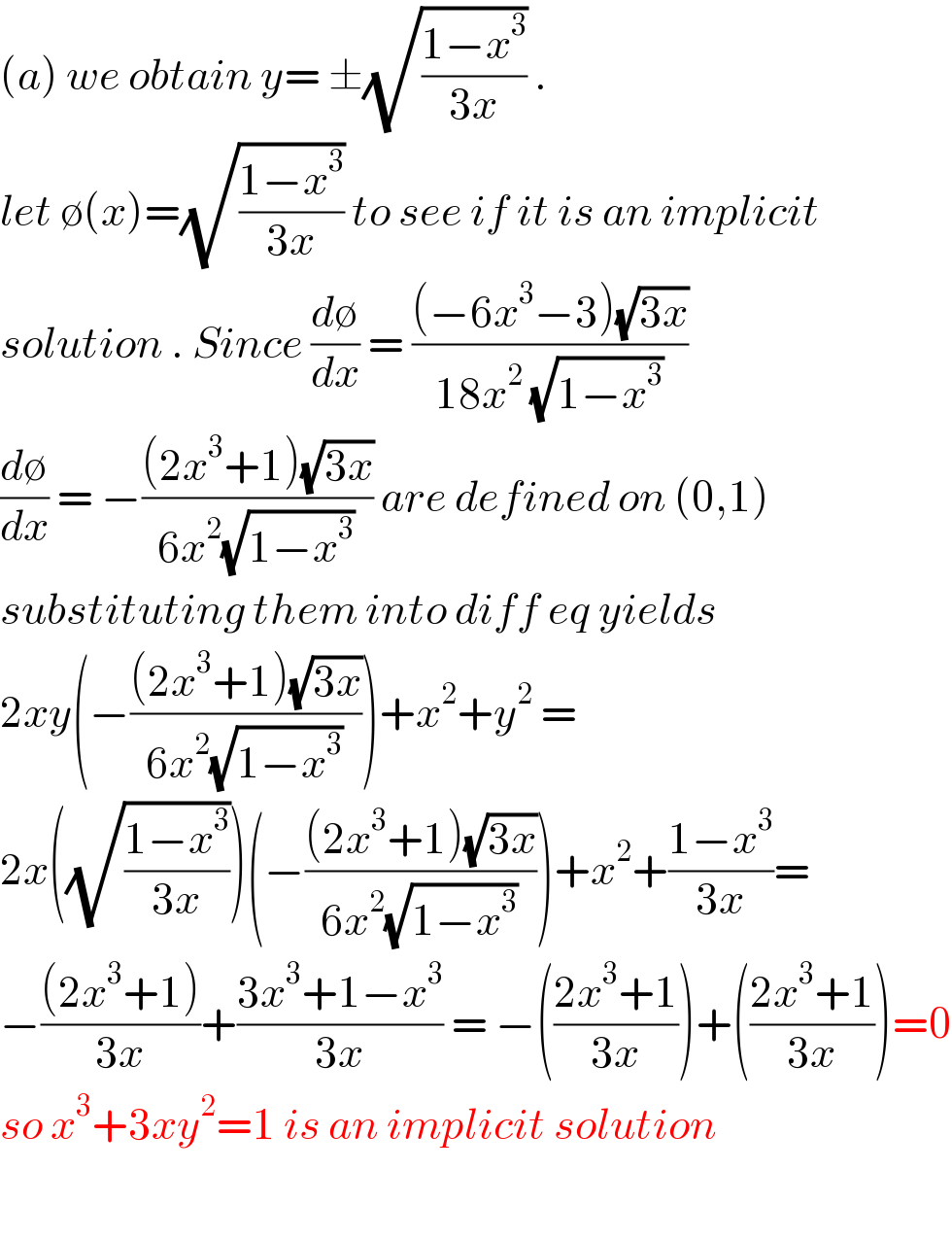Question Number 110227 by mohammad17 last updated on 27/Aug/20

Commented by mohammad17 last updated on 27/Aug/20

$${help}\:{me}\:{sir} \\ $$
Answered by bobhans last updated on 28/Aug/20

$$\left({a}\right)\:{we}\:{obtain}\:{y}=\:\pm\sqrt{\frac{\mathrm{1}−{x}^{\mathrm{3}} }{\mathrm{3}{x}}}\:. \\ $$$${let}\:\emptyset\left({x}\right)=\sqrt{\frac{\mathrm{1}−{x}^{\mathrm{3}} }{\mathrm{3}{x}}}\:{to}\:{see}\:{if}\:{it}\:{is}\:{an}\:{implicit} \\ $$$${solution}\:.\:{Since}\:\frac{{d}\emptyset}{{dx}}\:=\:\frac{\left(−\mathrm{6}{x}^{\mathrm{3}} −\mathrm{3}\right)\sqrt{\mathrm{3}{x}}}{\mathrm{18}{x}^{\mathrm{2}} \:\sqrt{\mathrm{1}−{x}^{\mathrm{3}} }} \\ $$$$\frac{{d}\emptyset}{{dx}}\:=\:−\frac{\left(\mathrm{2}{x}^{\mathrm{3}} +\mathrm{1}\right)\sqrt{\mathrm{3}{x}}}{\mathrm{6}{x}^{\mathrm{2}} \sqrt{\mathrm{1}−{x}^{\mathrm{3}} }}\:{are}\:{defined}\:{on}\:\left(\mathrm{0},\mathrm{1}\right) \\ $$$${substituting}\:{them}\:{into}\:{diff}\:{eq}\:{yields} \\ $$$$\mathrm{2}{xy}\left(−\frac{\left(\mathrm{2}{x}^{\mathrm{3}} +\mathrm{1}\right)\sqrt{\mathrm{3}{x}}}{\mathrm{6}{x}^{\mathrm{2}} \sqrt{\mathrm{1}−{x}^{\mathrm{3}} }}\right)+{x}^{\mathrm{2}} +{y}^{\mathrm{2}} \:= \\ $$$$\mathrm{2}{x}\left(\sqrt{\frac{\mathrm{1}−{x}^{\mathrm{3}} }{\mathrm{3}{x}}}\right)\left(−\frac{\left(\mathrm{2}{x}^{\mathrm{3}} +\mathrm{1}\right)\sqrt{\mathrm{3}{x}}}{\mathrm{6}{x}^{\mathrm{2}} \sqrt{\mathrm{1}−{x}^{\mathrm{3}} }}\right)+{x}^{\mathrm{2}} +\frac{\mathrm{1}−{x}^{\mathrm{3}} }{\mathrm{3}{x}}= \\ $$$$−\frac{\left(\mathrm{2}{x}^{\mathrm{3}} +\mathrm{1}\right)}{\mathrm{3}{x}}+\frac{\mathrm{3}{x}^{\mathrm{3}} +\mathrm{1}−{x}^{\mathrm{3}} }{\mathrm{3}{x}}\:=\:−\left(\frac{\mathrm{2}{x}^{\mathrm{3}} +\mathrm{1}}{\mathrm{3}{x}}\right)+\left(\frac{\mathrm{2}{x}^{\mathrm{3}} +\mathrm{1}}{\mathrm{3}{x}}\right)=\mathrm{0} \\ $$$${so}\:{x}^{\mathrm{3}} +\mathrm{3}{xy}^{\mathrm{2}} =\mathrm{1}\:{is}\:{an}\:{implicit}\:{solution} \\ $$$$ \\ $$
Commented by mohammad17 last updated on 28/Aug/20

$${thank}\:{you}\:{sir}\:{can}\:{you}\:{help}\:{me}\:{in}\:\left({b}\right) \\ $$
